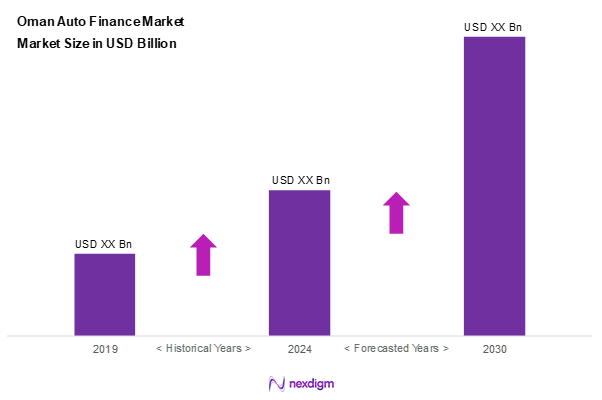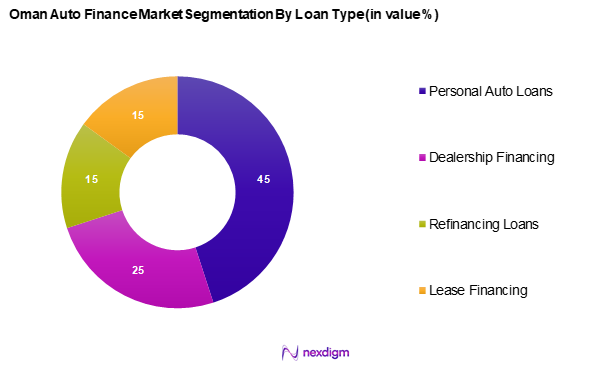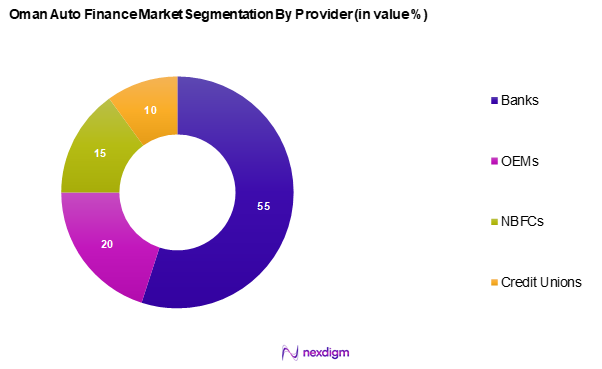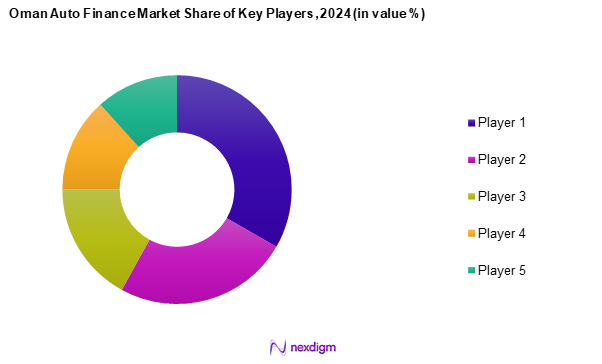Market Overview
As of 2024, the Oman auto finance market is valued at USD ~ billion, with a growing CAGR of 5.4% from 2024 to 2030. This value is driven by a combination of factors, including robust economic growth and a rising middle-class population that is increasingly inclined toward vehicle ownership. Financial institutions in Oman are providing competitive interest rates and flexible financial products, which further contribute to the market’s expansion. Reports from industry analyses underline the dynamic increase in consumer spending power and the growing significance of automotive financing options.
Muscat and Salalah dominate the Oman auto finance market, largely due to their dense population and economic activities as central hubs for business and trade. These cities have a high penetration of banking and financial services, facilitating easier access to auto financing. The presence of corporate headquarters of major financial institutions also contributes to the dominance of these areas, making vehicle financing more accessible to both individual and business customers.

Market Segmentation
By Loan Type
Oman’s auto finance market is segmented into personal auto loans, dealership financing, refinancing loans, and lease financing. Personal auto loans dominate the market share due to their widespread availability and flexibility in terms of tenure and interest rates. Financial institutions focus on personal loans because individuals constitute a substantial portion of the consumer base, looking to finance their personal vehicles with easier repayment plans.

By Provider
Oman’s auto finance market is segmented into banks, OEMs, NBFCs, and credit unions. Banks hold a dominant market share mainly due to their established reputation, extensive branch networks, and trustworthiness. They offer customized financial products and competitive interest rates, attracting a large number of consumers. Banks also have robust customer service infrastructure which enhances consumer confidence in securing loans for vehicle purchases.

Competitive Landscape
The Oman auto finance market is structured with a mix of local and regional players. Key players include banks like Bank Muscat and National Bank of Oman, which leverage their extensive networks and financial products to capture market share. The consolidation in the market underscores the importance and influence of these dominant institutions that have a deep understanding of local consumer behavior and financial needs.
| Company | Establishment Year | Headquarters | Interest Rates | Loan
Portfolio |
Number of Branches | Digital Platforms |
| Bank Muscat | 1982 | Muscat, Oman | – | – | – | – |
| National Bank of Oman | 1973 | Muscat, Oman | – | – | – | – |
| Oman Arab Bank | 1984 | Muscat, Oman | – | – | – | – |
| HSBC Bank Oman | 1948 | Muscat, Oman | – | – | – | – |
| Bank Dhofar | 1990 | Salalah, Oman | – | – | – | – |

Oman Auto Finance Market Analysis
Growth Drivers
Increasing Car Ownership
Oman is witnessing a steady rise in personal vehicle ownership, a key factor propelling the auto finance market. This growth is largely influenced by rising living standards and a stable economic environment, which together enhance consumers’ capacity to invest in personal transportation. A strong job market further supports consumer confidence, leading to increased demand for vehicle financing solutions. As more individuals view personal vehicles as a necessity rather than a luxury, the role of auto loans in facilitating ownership continues to expand.
Rise in Middle-Class Population
The expanding middle-class demographic plays a crucial role in shaping the auto finance landscape in Oman. As more people experience economic mobility, they are showing a higher willingness to adopt lifestyle upgrades such as personal vehicles. This shift is supported by growing disposable incomes, encouraging financial institutions to develop more personalized and accessible financing options. The increasing aspiration for personal convenience and mobility is prompting lenders to cater to this upwardly mobile segment with competitive loan products.
Market Challenges
Regulatory Compliance Issues
The regulatory framework governing the financial sector in Oman presents ongoing challenges for auto finance providers. Strict compliance requirements demand that institutions allocate considerable time and resources toward meeting guidelines related to transparency and consumer protection. While these regulations are vital for maintaining market integrity and protecting borrowers, they can restrict lenders’ ability to quickly adapt to changing market needs or to launch innovative financing products with ease.
Economic Fluctuations
Economic fluctuations present notable challenges, affecting the stability of the auto finance market in Oman. The IMF’s recent economic outlook indicated fluctuations in oil prices and GDP growth stalling around 2.7%, leading to unpredictable shifts in consumer confidence. Economic uncertainty tends to make consumers and businesses cautious about committing to long-term financial obligations such as auto loans.
Opportunities
Adoption of Digital Financing Solutions
The increasing integration of digital technologies into financial services presents a significant growth opportunity for the auto finance sector in Oman. As consumers grow more comfortable with online platforms, lenders are in a strong position to offer end-to-end digital loan services that enhance convenience and accessibility. Digital finance not only improves the customer experience but also allows institutions to streamline their operations and reach a wider audience, especially tech-savvy younger consumers.
Expansion in Rural Financing Programs
The rural market in Oman remains relatively untapped in terms of vehicle financing, presenting a compelling opportunity for growth. Government-led initiatives to improve financial inclusion have spotlighted the need for targeted lending programs in less urbanized areas. By offering customized finance products designed for rural populations, financial institutions can address mobility needs while also contributing to broader national goals around balanced regional development.
Future Outlook
Over the next five years, the Oman auto finance market is anticipated to experience substantial growth, bolstered by technological advancements, growing awareness of auto financing options, and expansion of rural financing programs. Government policies supporting financial inclusion and digital transformation will also play pivotal roles in shaping the future landscape of auto finance in Oman.
Major Players
- Ahli Bank
- Al Omaniya Financial Services
- Bank Nizwa
- Muscat Finance
- National Finance
- Oman Arab Bank
- Oman Orix Leasing
- Taageer Finance
- United Finance
- Sohar Islamic
- National Bank of Oman (NBO)
- Bank Dhofar
- Bank Muscat
- HSBC Bank Oman
- Oman Development Bank
Key Target Audience
- Automotive Manufacturers
- Financial Institutions
- Investment and Venture Capitalist Firms
- Banking and Financial Regulators (e.g., Central Bank of Oman)
- Automotive Dealerships
- Insurance Providers
- Government and Regulatory Bodies (e.g., Ministry of Commerce and Industry, Oman)
- Technology Solution Providers
Research Methodology
Step 1: Identification of Key Variables
The research initiates with mapping the auto finance market’s ecosystem in Oman, identifying key stakeholders like banks, financial service providers, and regulatory bodies. Comprehensive secondary research helps in defining influential variables affecting the market dynamics.
Step 2: Market Analysis and Construction
Historical data is analyzed to understand market penetration, customer demographics, and the financial institutions’ service provision spread. This phase also includes revenue assessment and customer satisfaction measurements to ensure data accuracy.
Step 3: Hypothesis Validation and Expert Consultation
Developed market hypotheses are validated through interviews with industry experts from prominent financial entities. These consultations provide practical insights into broader market trends and operational challenges faced by stakeholders.
Step 4: Research Synthesis and Final Output
Collaboration with major automotive and finance companies is done to validate data obtained from secondary research. This step ensures a comprehensive, accurate analysis reflecting the real-time market scenario in Oman.
- Executive Summary
- Research Methodology
(Market Definitions and Assumptions, Abbreviations, Market Sizing Approach, Consolidated Research Approach, Understanding Market Potential Through In-Depth Industry Interviews, Primary Research Approach, Limitations and Future Conclusions)
- Definition and Scope
- Market Genesis
- Timeline of Major Players
- Industry Business Cycle
- Supply Chain & Value Chain Analysis
- Growth Drivers
Increasing Car Ownership
Rise in Middle-Class Population - Market Challenges
Regulatory Compliance Issues
Economic Fluctuations - Opportunities
Adoption of Digital Financing Solutions
Expansion in Rural Financing Programs - Trends
Growth in Peer-to-Peer Lending
Increased Consumer Awareness - Government Regulation
Financial Conduct Authority Guidelines
Consumer Credit Regulations - SWOT Analysis
- Stake Ecosystem
- Porter’s Five Forces
- By Value, 2019-2024
- By Volume, 2019-2024
- By Average Interest Rates, 2019-2024
- By Loan Type, (In Value %)
Personal Auto Loans
Dealership Financing
Refinancing Loans
Lease Financing - By Borrower Profile, (In Value %)
Individual Borrowers
Businesses/Corporate Entities
Governmental Entities - By Vehicle Type, (In Value %)
New Vehicles
Used Vehicles - By Payment Schedule, (In Value %)
Monthly Payments
Bi-Weekly Payments
Annual Payments - By Provider, (In Value %)
Banks
OEMs
NBFCs
Credit Unions - By Interest Rate Type, (In Value %)
Fixed Rate
Variable Rate - By Region, (In Value %)
Muscat
Salalah
Sohar
Nizwa
Others
- Market Share of Major Players on the Basis of Value/Volume, 2024
Market Share of Major Players by Type Loan Segment, 2024 - Cross Comparison Parameters (Company Overview, Business Strategies, Recent Developments, Strengths, Weaknesses, Organizational Structure, Revenues, Distribution Channels, Number of Dealers, Unique Value Offerings, Customer Innovations)
- SWOT Analysis of Major Players
- Pricing Analysis Basis SKUs for Major Players
- Detailed Profiles of Major Competitors
Ahli Bank
Al Omaniya Financial Services
Bank Nizwa
Muscat Finance
National Finance
Oman Arab Bank
Oman Orix Leasing
Taageer Finance
United Finance
Sohar Islamic
National Bank of Oman (NBO)
Bank Dhofar
Others
- Market Demand and Utilization
- Borrower Spending Behaviour
- Regulatory and Compliance Requirements
- Needs, Desires, and Pain Point Analysis
- Decision-Making Process
- By Value, 2025-2030
- By Volume, 2025-2030
- By Average Interest Rates, 2025-2030


